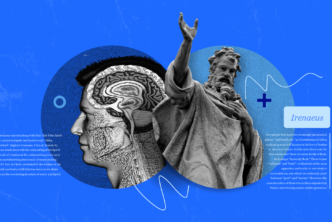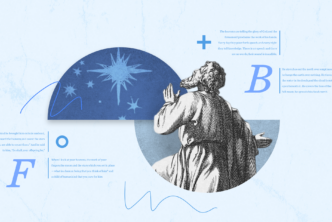Why, in the face of material prosperity and the endless production of greater and better goods, would anybody choose the life of the mind?
I use the definite article with purpose. There are plural “lives” of intellectual priority that one might live, whether that be as a scholar, writer, poet, editor, philosopher et al. But there is a singular habitus under which all these must be subsumed: the life.1
“Of the mind” suggests that the priority of that life is intellectual.2 That the centrifugal force by which all agencies of said person are energized is an intellectual one, first and foremost, and yet not entirely. Even the most erudite scholars must use their brains for activities not immediately recognized as intellectual.
But we may still assert that every activity of the committed intellectual is an action of purpose in the pursuit of a well-ordered, well-informed, well-trained mind for the sake of producing, and communicating for posterity, ideas.
The committed intellectual is a person who has devoted their life to the singular pursuit of a quest, an adventure journeyed via the tools, resources, and locations upon which any intellectual endeavor is embarked: books, libraries, seminars; reading, conversations, thinking; writing, editing, speaking. If, for the investment banker, more money makes more money, for the scholar, more questions generate more questions. Our stock-in-trade as intellectuals is inquiry. Our battles as scholars are won in the well-worn leather chair of the study, the flattened carpet of the library that bears the weight of our thoughts as we pace ideas out of our heads in confrontation with that ever-present Cerberus whose heads are Fatigue and Procrastination.
That is not to say that the committed intellectual foregoes adventure outside the book-lined study, whether that be climbing expeditions to the Alps, photography adventures in India, or road trips up the coast of Northern California. Those activities and ones like them should be a significant part of any scholar’s life timeline. Such experiences often serve to broaden one’s intellectual roadmap and enable travel along roads of inquisition and critical thinking that might otherwise be inaccessible.
And therein lies my point. Every activity of the person given over to the life of the mind must serve that ultimate purpose. Every penultimate activity either bolsters one’s intellectual capacity and motivation, or it crumbles and weakens the entire structure.
What then is required to live the life of the mind?
Commitment.
That this is the greatest virtue of a scholar is evident when we consider a few alternatives that fail as options for the person considering whether to pursue the life of the mind.
Passion.
Often considered the most important trait of a person willing to forego financial abundance (or other measures of success and well-being) for a life of reading and writing. But passion is insufficient. Passions change. They are unstable. They come and they go. On any given day you may choose to be a biblical scholar because you are “passionate” about the Bible, about reading, about theology, about writing. But tomorrow, when you’re facing the reality of driving a 15-year old car and unable to buy even a small home for your family, your passion might change quite suddenly to commercial real estate, or maybe investment banking. And those are fine things to be passionate about. But you can’t be both.3
Skill.
The façade of skill is a great deceiver. Skill only gets one so far. You might be (becoming) an expert at various ancient languages. You may be able to read very quickly with stunning levels of comprehension and devastating critique. And you might be an exceptional writer, able to summon lucid prose and recall an exhaustive lexicon of philosophical jargon without pausing your authorial flow.
But writing isn’t always easy. Writing is especially hard when your editor has told you to fix…everything. Or worse, your proposal is rejected six times. Neither will your incredible reading abilities in the LXX pay the bills; nobody pays anybody to simply read ancient Greek/Hebrew/Latin (and if they did, you couldn’t pay a mortgage from it); even grant monies are supplementary to typically low academic income.4 Your impressive aptitude at public speaking still won’t convince most major conference organizers to pay for your travel, lodging, and expenses, even if you are a VIP. Company credit cards are uncommon in the field of academia. In the life of the mind, you pay to play; but to play, you must have skill. Skill only gets you in the door.
Genius.
Perhaps considered the most valuable, and elusive, of the alternatives. Strive to be a genius scholar, if you will. Genius is a false friend. Indeed, who can measure it? How would one know if they were a genius, unless others lavished upon them such a curse of identity? And a curse it is. The recognition of it can drive the recipient of the title mad, and madness a poor scholar makes. If it doesn’t drive one mad, genius, once manifested in any scholar, writer, musician, or poet, will thereafter be expected in all further work. God forbid that later work is even better than the first, for a continually raised bar can only be surmounted so high. The situation being thus, genius will more likely drive one away from the life of the mind and onto a safer, inconspicuous vocation.
Commitment.
Here we come to the only legitimate, viable, demonstrable, and appropriate adjective for the person who desires to live the life of the mind. Most scholars have a hard go at life, at least in terms of the things that the world considers measures of success, whether that be financial prosperity, regional fame, and an excess of leisure time. The reason why commitment is the virtue par excellence is simply because commitment alone holds ones lips to the bittersweet morsel that is the intellectual’s habitus, or the life of the mind.
On a positive analysis, commitment enables you to press through the manifold challenges of a life of the mind, from postgraduate to emeritus professor, from literature BA to prolific novelist. If an intellectual holds fast to the virtue of commitment, drills the bolts of their existence into the concrete pillar of fidelity, if the chosen adjective of their identity is committed, then nothing will keep them from attaining the highest “good”,5 that is, the highest levels of intellectual achievement possible. What else could the life of the mind hope for?
And yet, there is a dark side to commitment. The concept, “to commit” to something, is amoral per se. Yet commitment can be an immoral monstrosity. Simply ask the question: what am I committed to? As a friend of mine expressed it recently, “When do you know if you are the aspiring artist unwilling to move on and grow up, and when do you know [that] you are going to make it? That line between commitment being the key ingredient for something magical and positive [or] something destructive is itself a razor’s edge.”6
On a negative analysis, then, commitment will drive a man to abandon his fatherly duty of raising God-honoring, people-loving children. Commitment entices a woman to tiptoe the edge of that sucking wormhole, debt. The temptation of earning expensive degrees, yet with no immediate hope to repay money borrowed gives birth to a sick cancer that will erode the soft marrow of a family’s inner structure. Commitment to the life of the mind can (and does, there are many examples) impel the scholar to consume those precious home-hours with study and writing (and grading), like a ravenous yet ignorant beast who rips through a rural village at night, and then excuses itself with an, “I’m sorry. I was hungry.” Publish more is a lust hard to contain as to confess.
An analogy. As a scholar, a writer, one who has chosen the life of the mind, you are always ever climbing ice-encrusted mountains. Surely the exhilaration of the views, the cold which excites the deepest reservoirs of inspiration within you, and the utter sense of victory at having summited each peak are worth the climb. But having summited that mad ascent, when you turn to survey the view, you look back down the ridge and see the broken bodies of your children fallen in the snow, the hollow eyes of your exhausted spouse who has endured for years the maniacal demands of your mantra, “just one more publication”, the friends consumed by the avalanches of your self-imposed solitude; what then of your commitment? What then of your chosen life of the mind? What has your commitment done to you? To them?
If commitment is the greatest of scholarly virtues, its greatness is manifest not in publications but in persons. This is all the more pertinent for those who call themselves Christians. Certainly, biblical scholarship is not restricted to confessing believers in Jesus Christ, but if those who call themselves Christians affix the adjective committed to their self-identity as scholar/writer/poet/pastor, they yet stand under the same imperative that whispers forth from the bosom of every person inhabited by the Spirit of God. To follow Jesus is to be committed to him wholesale as Sovereign, and therefore every other commitment, including the most defining of one’s personal, lifelong identity (i.e. the life of the mind) stands subservient in the hierarchy of authority. Christ is yet King.
So choose carefully. The life of the mind is not an easy life, nor is it as desirable as you perhaps desire. The life of the mind, when conceived of in its comprehensive sense, is a posture of permanency. The life of the mind, as an identity, is marked by the virtue of commitment. Indeed, a stance of fidelity to a comprehensive, intellectual life can be a great witness to a world of individuals adrift on the wreckage of non-commitment, the splintered hull of modern fidelity (to anything outside oneself). Or, the life of the mind can discharge the cannons that break the ship to pieces.
Beware that your personal hierarchy of commitments, to God, to family, to church, to mind are arranged as they belong. Only then can the life of the mind transcend the mundanity of mere academic inquiry in order to function holistically as a life lived in worshipful obedience, through which you, your family, your church and this world will flourish from your intellectual labors, and your Christian deference.
The Editor
- On the concept of habitus as all-encompassing of human thought and praxis, see Bourdieu, Pierre. Outline of a Theory of Practice. Cambridge Studies in Social and Cultural Anthropology, Cambridge University Press, 1977.
- The essential reading is still A. G. Sertillanges’ The Intellectual Life: Its Spirit, Conditions, Methods, Catholic University Press of America, 1992 (reprint).
- When I say you can’t “be” both, I am not suggesting that one cannot work a full-time job in, say, finance, and have nothing left over to contribute in terms of research and writing. There are examples of people who have accomplished much in the way of writing, etc. while working a day job. My claim, rather, is ontological. You cannot “be” a scholar and an investment banker and consider yourself living the life of the mind. Choosing the life of the mind means to forego the alternative, which is not a life of the non-mind, but a life of _____ (the blank can be any vocation in which intellectual pursuit is not the priority, with or without a definite article).
- Of course, whether one considers income amounts to be “high” or “low” depends on one’s background, family history, location of residence, and so forth, but when one considers the amount of training and education required, the scarcity of available jobs, the job demands outside of normal working hours, and comparable incomes levels for one’s non-academic peers, the income of a typical academic is quite low.
- “Good” is here understood in Aristotelian terms, the argumentative thrust of Nichomanchean Ethics from its opening lines.
- In conversation with the brilliant Jacob Cerone (Ludwig-Maximilians-Universität München).





